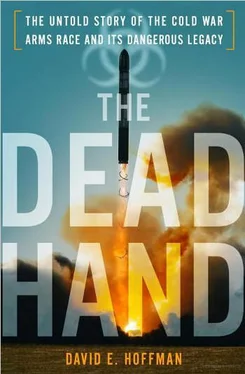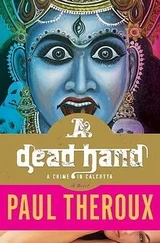In the face of these doubts, Gordievsky promised: “I will take a risk. I will put the documents in my pocket and come to the meeting, and you will make photocopies.” Soon, he brought them thirteen pages plus a cover memorandum detailing how the intelligence collection was to be carried out. Gordievsky recalled later that his chief handler, Jack, “was astonished and could scarcely believe” the papers, “so crass were the Center’s demands and so out of touch with the real world.”
On February 17, a document marked sovershenno sekretno , or top secret, had arrived in London for the top KGB official, known as the resident. Arkady Guk was a boastful but ineffective resident who drank heavily. The importance of the document was indicated by the fact it was addressed to each resident by name, marked “strictly personal,” and ordered to be kept in his special file. The title of the document was ominous: “Permanent operational assignment to uncover NATO preparations for a nuclear missile attack on the USSR.”
“The February directive for Guk contained unintentional passages of deep black comedy, which revealed terrifying gaps in the Center’s understanding of Western society in general and of Britain in particular,” Gordievsky recalled. For example, Guk was told that an “important sign” of British preparations for nuclear war would probably be “increased purchases of blood and a rise in the price paid for it” at blood-donor centers. He was ordered to report immediately any changes in blood prices. The KGB failed to realize that British blood donors are unpaid. Likewise, the KGB headquarters had a “bizarre, conspiratorial image of the clerical and capitalist elements in the establishment, which, it believed, dominated British society,” so Guk was ordered to watch for signs that the church and bankers had been given advance warning of nuclear war.
The February instructions contained a staggering workload, page after page of demands. The London residency was supposed to watch the number of cars and lighted windows at government and military installations, and report any changes. It had to identify routes, destinations and methods of evacuation of government officials and their families, and devise plans to monitor preparations for their departure. 64
While the Soviets watched for signs of war preparation, Reagan decided to speak bluntly about his views of the Soviet system, as he had done in the British Parliament. He was worried about the expanding nuclear freeze movement. In early March 1983, he wrote in his diary, “I’m going to take our case to the people, only this time we are declassifying some of our reports on the Soviets and can tell the people a few frightening facts: We are still dangerously behind the Soviets and getting farther behind.” In his memoirs, he noted that Nancy Reagan tried to persuade him to “lower the temperature of my rhetoric.” He said he refused. 65
On March 8, Reagan flew to Orlando, Florida, for a speech to a group of evangelical Christian ministers. In the address, Reagan described the Soviet Union as “the focus of evil in the modern world” and urged the ministers to reject the nuclear freeze. “So in your discussions of the nuclear freeze proposals,” he said, “I urge you to beware the temptation of pride—the temptation of blithely declaring yourself above it all and label both sides equally at fault, to ignore the facts of history and the aggressive impulses of an evil empire, to simply call the arms race a giant misunderstanding and thereby remove yourself from the struggle between right and wrong and good and evil.”
The words “evil empire” came to embody Reagan’s view of the Soviet Union. He later recalled that he did it on purpose. “I made the ‘Evil Empire’ speech and others like it with malice aforethought; I wanted to remind the Soviets we knew what they were up to.” 66
Enthusiastic about what he heard from the joint chiefs about missile defenses in February, Reagan decided to announce his idea. The commission he had appointed on the MX was due to report in April, but Reagan pushed his staff to come up with an announcement on missile defense even before the commission was finished. The president was to deliver a nationally televised address about the defense budget on March 23. Although McFarlane had reservations about moving so quickly, he began to draft an insert for the address that would launch a research effort toward strategic defense. McFarlane typed the first draft March 19. It was a major change from decades of American reliance on offensive forces. The president did not consult Congress, the allies, or even the cabinet until the last minute. Nor did he consult the commission on strategic forces, which was still hard at work. McFarlane said it was Reagan’s idea to keep it under wraps to keep his potential opponents off-guard. 67
The idea had materialized largely outside the official policy-making channels. Just weeks before, Reagan signed a new directive on overall strategy toward the Soviet Union in the wake of Brezhnev’s death. The nine-page document covered all the key military, political and economic questions. Yet this key document, a foundation of American policy, included not a single word about missile defense. 68Likewise, by this point, Reagan had submitted four separate defense budget requests to Congress; none made a priority of missile defense. 69The joint chiefs were surprised; they had no idea that Reagan was going to act so quickly. 70Shultz heard of the proposal only two days before Reagan went on national television, and had grave doubts about it. 71Weinberger was opposed, and learned of it at the last minute, while traveling in Europe. Some of Reagan’s aides learned only on the day of the speech. Reagan’s diary shows that after Shultz objected on March 21, he rewrote the section on strategic defense; the next day he rewrote more of the speech—“much of it was to change bureaucratic into people talk.” 72Reagan said he was working on it “right down to deadline” on March 23. Among others, Teller had been invited as a guest to witness the broadcast, sitting on a folding chair in the East Room of the White House while Reagan spoke from the Oval Office.
In the address, Reagan described yet again the window of vulnerability. The Soviets, he said, “have enough accurate and powerful nuclear weapons to destroy virtually all of our missiles on the ground.” Reagan said deterrence had worked—so far. He promised to keep negotiating with Moscow. But then Reagan said he wanted to offer another way.
In words he had written by hand into the text, and which echoed what Watkins had said in their meeting, Reagan declared, “Wouldn’t it be better to save lives than to avenge them?” Reagan said that in recent months, he and his advisers and the Joint Chiefs of Staff “have underscored the necessity to break out of a future that relies solely on offensive retaliation for our security.” Reagan added, “Over the course of these discussions, I have become more and more deeply convinced that the human spirit must be capable of rising above dealing with other nations and human beings by threatening their existence.” 73
“Let me share with you a vision of the future which offers hope. It is that we embark on a program to counter the awesome Soviet missile threat with measures that are defensive. Let us turn to the very strengths in technology that spawned our great industrial base, and that have given us the quality of life we enjoy today.”
Reagan then asked: “What if free people could live secure in the knowledge that their security did not rest upon the threat of instant U.S. retaliation to deter a Soviet attack, that we could intercept and destroy strategic ballistic missiles before they reached our own soil or that of our allies?” He summoned “the scientific community in our country, those who gave us nuclear weapons, to turn their great talents now to the cause of mankind and world peace, to give us the means of rendering these nuclear weapons impotent and obsolete.”
Читать дальше












